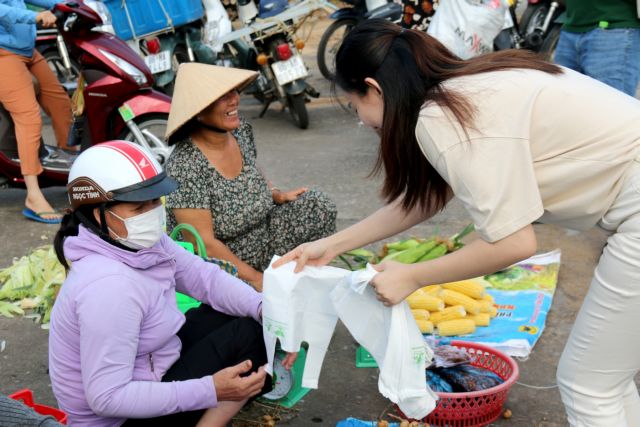The event title "Viet Nam Consumer Trends Forum 2023: Trends and Retail Market" was held by the Institute for Brand and Competitiveness Strategy (BCSI).

Consumers were increasingly attaching importance to sustainability over time, said Dang Thuy Ha, northern director of NielsenIQ Viet Nam, at an event in Ha Noi on Wednesday.
The event titled "Viet Nam Consumer Trends Forum 2023: Trends and Retail Market", was held by the Institute for Brand and Competitiveness Strategy (BCSI).
Important factors when consumers choose a brand were reasonable price, safety and hygiene, good for health, reliable brand, sustainability and eco-friendliness, said Ha.
Fifty-five per cent of consumers surveyed by NielsenIQ Viet Nam in 2023 highly appreciate the sustainability factor in consumption.
As proof, Ha said that 49 per cent of consumers brought their own bags or use recycled bags when shopping.
47 per cent only buy essentials and avoid waste. 45 per cent are conscious of saving electricity at home and 45 per cent sorting recyclable waste.
Specifically assessing from separate research on consumers in Ha Noi and HCM City, Trinh Nguyen Ngoc Linh, Senior Manager of Intage Viet Nam Project, said that 95 per cent of consumers in these two big cities have an awareness of environmental protection.
Fifty-nine per cent of consumers choose to eat green vegetables and grains more often.
61 per cent prioritise making use of natural light as much as possible, 44 per cent reuse old clothes instead of buying new ones unnecessarily.
This study also shows that consumer segments are aware of green consumption, in which 24 per cent said living green to save, 22 per cent green consumption to focus on health; and 9 per cent accompanied the trend.
Do Van Viet, representative of the Viet Nam E-commerce Association (Vecom), said that more and more consumers choose e-commerce as a regular shopping channel because of its multi-faceted convenience.
Currently, e-commerce in Viet Nam is developing rapidly with a double-digit growth rate per year.
More and more businesses and sellers are turning to e-commerce to reach consumers, especially on channels such as social networks and artificial intelligence.
Citing the example of Bac Giang Provincial Youth Union selling lychees on TikTok Shop Viet Nam, Viet said that many live stream sales sessions in just a few hours could sell tonnes of litchi with thousands of orders.
"Businesses need to grasp trends, have solutions to access e-commerce channels and need to deploy multi-channels to create many touch points with customers," he recommended.
Emphasising digital transformation solutions to bring agricultural products closer to consumers, especially young consumers, Dr. Vo Tri Thanh, Director of the Institute for Brand and Competitiveness Strategy (BCSI), said that the leading role was a very important need in the transformation; at the same time, digital transformation needed to be tied to the real world, the real strategy of the business could be successful.
In addition, thanks to the "online shop" developed in the digital environment such as Tik Tok, Facebook, thousands of households making agricultural products from mountainous areas such as Lang Son and Lao Cai provinces have sold hundreds of orders just through “livestreams”.
“Thanks to the new business models that digital transformation brings, there are aspects of business that can caught up. Although it may be expensive in the medium term, in the long term, digital transformation brings great economic benefits to the Vietnamese retail market,” said Thanh.
Suggesting for manufacturing and retail businesses, Dang Thuy Ha, northern director of NielsenIQ Viet Nam, offers short, medium and long-term solutions.
That was developing a new retail model associated with green product experience, establishing clubs for sustainable consumers, awarding points for buying sustainable products, she added.
She also suggested businesses replace or reduce plastic in packaging; develop carbon-neutral factories and farms; use electric vehicles, and develop regenerative agriculture.
At the event, Nguyen Minh Tien, Director of the Trade Promotion Centre for Agriculture under the Ministry of Agriculture and Rural Development, shared, recently, the trend of safe food of natural origin and environmental friendliness has become popular and become a modern consumption. This is an inevitable trend not only in Viet Nam but all over the world.
Facing the trend of consuming safe products, especially organic products with sales in Viet Nam reaching US$208 billion last year, Tien recommended solutions in which authorities need to control the quality of agricultural products on the market, improve the effectiveness of consumer protection; promote information and communications so that clean producers can see the value of standard production, and consumers understand the value of clean agricultural products; especially need to improve agricultural production capacity to meet market demand. — VNS





